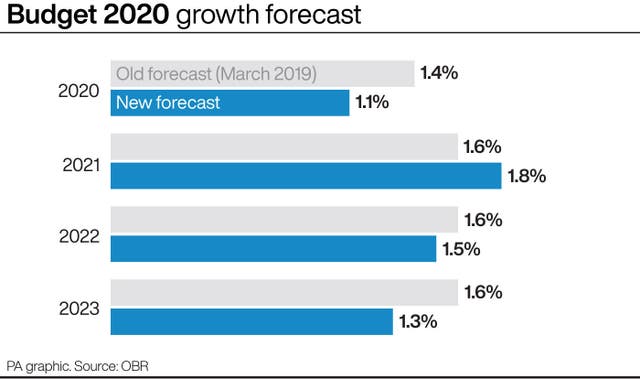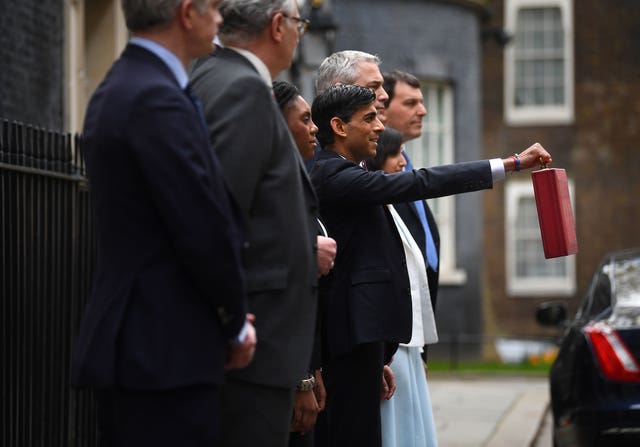Sunak pledges £30 billion stimulus to combat coronavirus outbreak
The Chancellor unveiled an emergency package of support for citizens and businesses in response to the Covid-19 crisis.

A £30 billion package to stimulate the economy was announced by Chancellor Rishi Sunak as the Government and Bank of England sought to protect jobs and livelihoods against the coronavirus crisis.
The Chancellor acknowledged the British people were worried about the threat posed by the virus “but they are not daunted”.
Mr Sunak said there was “likely to be a temporary disruption” to the economy as a result of coronavirus but insisted his plans would bring “stability and security”.
Measures set out by the Chancellor included:
– A £1 billion business rates holiday for retail, leisure and hospitality firms with a rateable value of under £51,000
– The Government will fully meet the cost of providing statutory sick pay for up to 14 days for workers in firms with up to 250 employees, providing over £2 billion for up to two million businesses.
– Reforms to the benefits system to make it easier to access funds will provide a £500 million boost to the welfare system, along with a £500 million hardship fund
– A £3,000 cash grant to businesses eligible for small business rates relief
Mr Sunak said: “Taken together, the extraordinary measures I have set out today represent £7 billion to support the self-employed, businesses and vulnerable people.
“To support the NHS and other public services, I am also setting aside a £5 billion emergency response fund – and will go further if necessary.”

Other plans represented another £18 billion of “additional fiscal loosening” and “that means I am announcing today, in total, a £30 billion fiscal stimulus to support British people, British jobs and British businesses through this moment”.
Hours before the Budget, the Bank of England set the scene with an emergency interest rate cut from 0.75% to 0.25% and a series of other measures designed to help businesses and households through a coronavirus economic shock “that could prove sharp and large, but should be temporary”.
)Mr Sunak said: “I know how worried people are. Worried about their health, the health of their loved ones, their jobs, their income, their businesses, their financial security.
“And I know they get even more worried when they turn on their TVs and hear talk of markets collapsing and recessions coming. People want to know what’s happening, and what can be done to fix it.
“What everyone needs to know is that we are doing everything we can to keep this country, and our people, healthy and financially secure.”

He added: “We will get through this – together. The British people may be worried, but they are not daunted.
“We will protect our country and our people. We will rise to this challenge.”
The Chancellor said that without accounting for the impact of coronavirus, the Office for Budget Responsibility has forecast growth of 1.1% in 2020 , 1.8% in 2021 and then 1.5%, 1.3%, and 1.4% in the following years.
Despite speculation that he would ditch the framework on spending set by predecessor Sajid Javid, Mr Sunak said that his Budget is delivered “not just within the fiscal rules of the manifesto but with room to spare”.
He also announced that fuel duty would be frozen for another year and there would also be no increase in duties on alcoholic drinks.
And he announced an increase in the National Insurance threshold from £8,632 to £9,500, which he said would be worth £100 a year to 31 million people.
The entrepreneurs’ relief tax break will be scaled back, saving £6 billion over the next five years.

But Mr Sunak said “most of that money” will go back to firms through a series of other measures: increasing the tax break for research and development expenditure, the structures and building allowance and increasing the employment allowance by a third to £4,000.
The Chancellor also confirmed plans to abolish the “red diesel” tax relief for most sectors although farmers will continue to benefit.
A £120 million fund will be used to repair defences damaged in the winter floods, with £5.2 billion to be invested in flood defences over the next six years.
Mr Sunak said from December 1 VAT on digital publications would be abolished, ending the “reading tax”.
The Chancellor promised £27 billion in road improvements, “the biggest ever investment in strategic roads and motorways”.
Investment in research and development would be increased to £22 billion and £800 million for a new “blue-skies funding agency” modelled on the Arpa programme in the US, a scheme championed by Boris Johnson’s aide Dominic Cummings.
Responding to the Budget statement, Labour leader Jeremy Corbyn welcomed the steps designed to head off any economic crisis caused by the coronavirus but said the UK was going into that crisis with public services “on their knees” and an economy that was “flat-lining”.
He said the extra money for the NHS was “too little too late” and the service was ill-equipped to deal with medical crisis due to the cuts he said it had suffered.
He also said the claim that public spending was being given the biggest boost for 30 years was a “sleight of hand”, adding: “It’s only the biggest since they began their slash burn assault on public services.”





